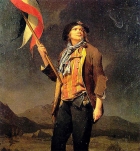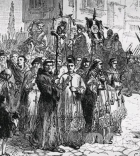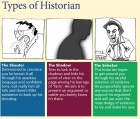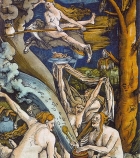Using historical scholarship
There is a long tradition of history teachers using historical scholarship whether to shape their enquiry questions using real questions that academic historians pursued, to gain new knowledge for enriching lessons or simply to keep inspiring the passion that fired their first love of history so that they can display it to pupils in the classroom itself. A tradition within this is the curriculum component ‘Interpretations’ - a sustained fixture of England’s national curriculum for history since 1991 which has spawned its own tradition of shared practice, research and debate. If you want to find out specifically about ‘Interpretations of history’, where there will be much reference to historical scholarship, go to Interpretations. Read more
-

Polychronicon 150: Interpreting the French Revolution
ArticleClick to view -

Marr: magpie or marsh harrier?
ArticleClick to view -

Teaching students to argue for themselves - KS3
ArticleClick to view -

How my interest in what I don't teach has informed my teaching and enriched my students' learning
ArticleClick to view -

Passive receivers or constructive readers?
ArticleClick to view -

Creating confident historical readers at A-level
ArticleClick to view -

Shaping macro-analysis from micro-history
ArticleClick to view -

Cultivating curiosity about complexity
ArticleClick to view -

Is it time to forget Remembrance?
ArticleClick to view -

Teaching Year 9 about historical theories and methods
ArticleClick to view -

A team-taught conspiracy: Year 8 are caught up in a genuine historical debate
ArticleClick to view -

Duffy's devices: teaching Year 13 to read and write
ArticleClick to view -

Rethinking progression in historical interpretations through the British Empire
ArticleClick to view -

Interpretations and history teaching
ArticleClick to view -

Meeting the historian through the text
ArticleClick to view -

Reading and enquiring in Years 12 and 13
ArticleClick to view -

Conceptual awareness through categorising: using ICT to get Year 13 reading
ArticleClick to view -

Narrative: the under-rated skill
ArticleClick to view -

Working with Boudicca texts - contemporary, juvenile and scholarly
ArticleClick to view -

Teaching pupils how history works
ArticleClick to view

